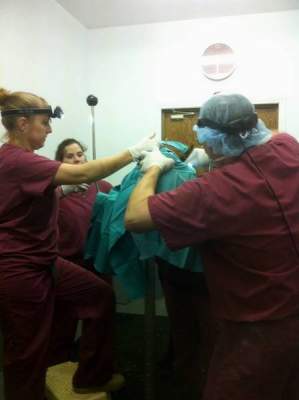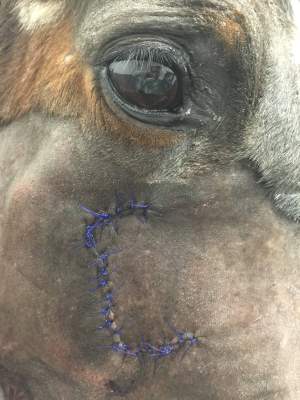 Holly, a six year-old Quarter Horse, was recently examined as she was struggling with some chronic dental issues. After an oral exam and dental x-rays, it became apparent that she was suffering with four decayed and abscessed cheek teeth.
Holly, a six year-old Quarter Horse, was recently examined as she was struggling with some chronic dental issues. After an oral exam and dental x-rays, it became apparent that she was suffering with four decayed and abscessed cheek teeth.
One of the four teeth was solid enough to extract orally, but the other three were weakened by the decay and they required removal by repulsion. Dr. Timothy Ellis, along with the assistance of Dr. Anna Herath and two technicians, extracted the teeth using a dental punch and applying pressure to the roots of the teeth through a portal hole through the mare’s sinus cavities.
A half-moon incision is made over the sinus on the side of the patient’s face just in front of and below the eye on the affected side. The skin is elevated, and a “portal” hole the size of a nickel is made into the sinus using an instrument known as a trephine. Once the sinus is open, a dental punch is positioned over the root of the affected tooth. X-rays are used to identify proper positioning prior to repelling the tooth with a stainless mallet. The gum is elevated away from the affected tooth, and the tooth is extracted. After removing the tooth, a final x-ray is taken to ensure that no fragments were left behind. The empty “socket” is then cleaned of debris and flushed with an antibiotic flush. The alveolar socket is then packed with a dental impression material to allow the bone to heal and fill in. Eventually the dental packing is “pushed” out with healing tissue and in the end the gums heal over the void where the tooth once was.

Sinus Portal Post Tooth Repulsion.
In Holly’s case three of the teeth were removed, and the final tooth will be removed in two weeks. The surgical procedure to extract the first three diseased teeth spanned approximately six hours. “Typically we are dealing with just one bad tooth,” Dr. Ellis explained, “and those procedures usually take 2 hours.”
It is vital that bad teeth are identified early when the tooth is still strong which allows us to remove them orally. Horses should have their teeth checked at least once a year by veterinarian skilled in the field of dentistry. A routine dental float with sedation costs approximately $125.00. Routine dental care is crucial to identifying problems early and correcting them before they do additional damage to the other teeth. A good mouth is essential to good equine health.
If you would like to see additional pictures of this procedure, please visit the Equine Dentistry album in our photo gallery.